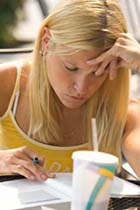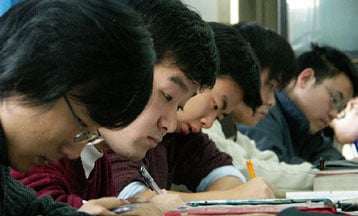* Terms and Conditions apply.
 Develop ways to read books more quickly and effectively
Develop ways to read books more quickly and effectively
1. Make sure you try to scan your textbook prior to arriving at your class.
2. When scanning a book make sure you are reading for both details and ideas.
3. Always read any assignment guides and materials in FULL.
4. Try to always look for what are the main or central ideas that need to be covered and what exactly will be assessed.
5. A useful measure to recall the material you have read is to get another person to ask you questions or alternatively ask yourself questions about the material you have read. i.e. What is the main assessment criteria?
6. Carry out reflection by transferring the different information that you have read into useful and practical knowledge. (i.e." Why exactly is this criteria or point important?)
7. Write brief summaries.
 How to improve my learning in the classroom
How to improve my learning in the classroom
8. ALWAYS ..Go to your class. . . . Every lesson is important. Do not skip lessons.
9. Try to think about the specific subject prior to you attending the class. Try to anticipate what you think will be discussed in class.
10. Make sure you always pay attention for the entire class. Do not allow yourself to become distracted.
11. Concentrate on what your teacher is doing and saying, not on the people walking down the corridor or the notices on the class notice board.
12. Always focus on what the teacher/speaker is actually saying. Try to learn how to tune out the teacher/speaker's voice quality, mannerisms, appearance, accent etc.
13. It is always important to make sure you are listening with your mind not judging what is said with your emotions.
14. Try to develop the skills of listening for the important word cues that illustrate or reveal the teacher/speaker’s emphasis. These include words like most important, on the other hand, in addition to etc.
Tips on note taking
15. Make sure you take as complete notes as possible. Practice your note taking skills. Learn how to abbreviate words and develop you own shorthand methods. One useful tip is to leave out vowels (wrk hrd) and use a ‘g’ for ‘ing’ (stdyg). Use other common single letters or different symbols. For example:
| The letter or symbol | Replaces |
| ? | question |
| w/o | without |
| b/c | because |
| 2 | to, too, two |
| & | and |
| 4 | for, four |
| ch | chapter |
| p | page |
| # | number |
| b4 | before |
| etc. | and others |
| G8 | great |
| $ | dollars |
16. Make sure you get the important facts or details written down correctly.
17. Try to have just one notebook and keep all your individual subject specific notes in that one book.
18. It is important to re-read and review your notes. Read them again after the class and try to fill in any blanks or missed out notes. Read and review again before the next class in order to remember what you covered last time and try to anticipate what you expect to come this time.
Tips on exam taking
19. Read the whole exam paper first. Make sure you read all the relevant exam questions first.
20. It is good to answer what you think are the easiest questions first.
21. Make sure you underline or highlight the most important facts and any key words in questions before you begin to write your answer.
22. It is always good to take a couple of minutes to organize your thoughts before you begin to write.
23. When you are taking a true/false or multiple choice test pay attention exactly what is written - consider the absolutes. Choose the BEST answer.
24. Do not leave a multiple choice or true / false question blank.
24. Always try to answer any questions you are sure you know the answer to first. Come back to the more difficult ones later.
25. Use your time wisely. Do not spend more than the allocated length of time any one specific question.
26. Never leave an exam early. Look back over your answers if you have the time and proof read carefully.
Important dos and do nots
27. Do not study for a test while watching television or eating a meal etc.
28. Do not try to study while straining to listen to the basketball game on the TV in the other room.
29. Do not stay up all night studying.
30. Do not try to study when you are very sleepy.
31. Do practice past papers and exam questions to improve your test performance.
32. Do hand in your homework neatly done and on time.
33. Do practice different memory strategies.
34. Do stay healthy and fit and try to eliminate your bad time wasting habits.
Managing you time
35. It’s a good idea to keep a daily/weekly "to do" calendar/notebook. Put the different tasks in the order of priority. Make sure your list is realistic.
36. It is advisable to try to schedule work or study that demands high levels of concentration, such as taking notes on a specific text in 50 minute time periods. Then have a short break.
37. Make sure you have always allowed enough time in your schedule for conducting library research.
38. When researching on the internet do not become distracted by irrelevant sites.
39. Get specialist help wherever possible. Make sure assessable work has been properly proofread before submitting it
40. Get some sleep.
41. Balance your time – even though study is extremely important, don’t cancel all of your leisure activities either.